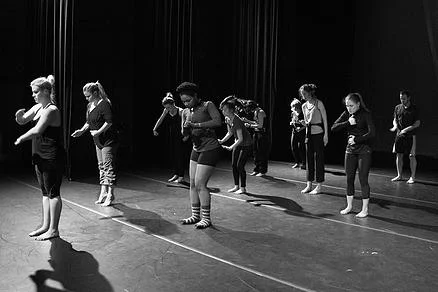Spark and Ruin: a Story of Re-beginning, the piece that was developed through The Flint Project, premieres at Space Place Theater at the University of Iowa in just two days.
Read MoreIt's hard to believe this time is finally here. Though next week's performance is not the end of The Flint Project, it is the end of this phase, and I'm so excited to share this work with audiences here in Iowa City!
Read MoreI'm curious about the role live performance plays in our digital culture. We process so much in such short spans of time, that it surely translates into a different experience with live art. I don't think this is good or bad, but I do think it's important to acknowledge it. And to work with the conditions in which we currently live to try and effectively share information and ideas with an audience.
Read MoreI am thinking about lines: assembly lines, color lines and red lines, partitioning, zoning, segregation. I had the dancers spend three minutes with a clip from "Master Hands" (a 1936 documentary filmed in the Chevrolet plants in Flint, just a few months before the Sitdown Strike).
Read MoreAll of the people we met with this week spoke of the importance of empowerment in individuals; change starts with a single person, one idea or action. And this must come from looking beyond the self; recognizing other human lives as complicated and important; placing value on a human life over “right and wrong,” or a simplified definition of humanity. Human lives are not currency. Every person has a story as valid and meaningful as that of anyone else.
Read MoreTechnology has made our world “smaller” than ever. Though we might be “far away,” geographically, we have the power to feel emotionally close—distance carries different value than it did before now. But has it also changed how we define or relate to communities? Does it change how we think about the community we come from? Do we still feel the same connection? What are the implications for a community like Flint?
Read MoreIn our travels throughout the city, she shared that everything seems to fall on one far end of a spectrum; Flint is a city of contrasts. She noted the tension created when considering large mansions in the same city as so many empty lots and boarded up homes and buildings; the abundance of old liquor stores with boards over doors and windows, only blocks from our beautiful Farmers Market; the dramatic closing of so many Flint schools in contrast with the wealth of culture on the Cultural Center campus...
Read MoreIn this process, I find my self in a constant state of inquiry. I am always checking in with myself—checking my assumptions and expectations, my privilege, my own biases born out of my own experiences. In many ways, this is incredibly important. By maintaining a constant awareness of these thought processes, I think I have a greater chance of telling a truthful story that speaks to the collective identity of a community and also honors individual contributions to that identity. I am also aware of the significance of my role as the artist, and the importance of having a point of view.
Read MoreBecause I’m doing most of my thinking and processing away from Flint, one of things I’m noticing is that although I have a lot of strong memories and images that have stayed with me from my experiences growing up there, I often remember the places as they were when I was fully immersed in the environment all the time.
Read MoreThree things stood out as key in the development of our work during this research session: body, environment, and time. These three components could be lived and experienced personally and immediately. By reliving this experience through embodiment, we could both draw connections and identify what held value for us.
Read More









